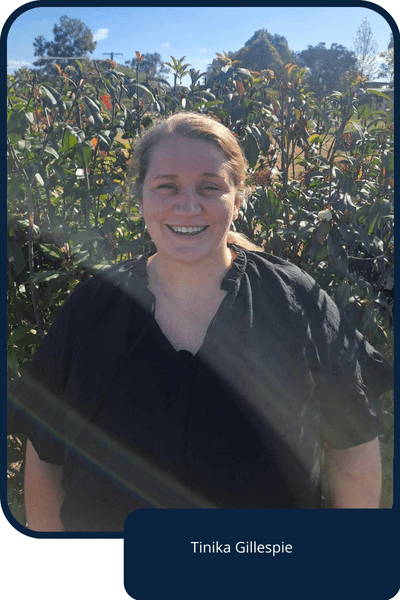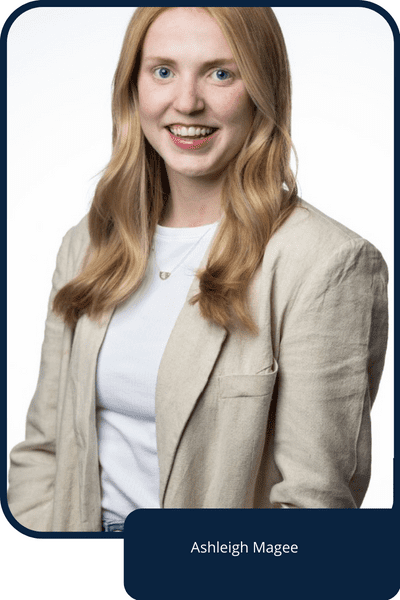OT prac students rise to the challenge for assistive technology resource project
As Occupational Therapy (OT) students Tinkia Gillespie and Ashleigh Magee discovered, we involve our students in real projects that have tangible, positive outcomes for our clients. We spoke to them to find out more about their practical placement experience and how it will equip them for their future careers.
Nothing beats learning on the job, which is why KINNECT enthusiastically offers OT, exercise physiology, rehabilitation counselling and osteopathy students the opportunity for practical placements with our teams around the country.
Tinika and Ashleigh, both in their fourth and final year of study at the Australian Catholic University joined us in mid-2023 for a practical placement in the format of a special project. Both students took the lead in developing a library of fact sheets for assistive technology devices that may be used by workers to support their rehabilitation. These resources needed to be written and presented in a way that was accessible for people from a wide variety of cultures and literacy levels.
Why did you choose to do your placement with KINNECT?
Tinika: I was looking at several providers, but I chose KINNECT because of the project outline we were given and liked what it was going to cover and what I could potentially learn.
Ashleigh: I had a list of five opportunities based on location. KINNECT was my first preference based on previous placement experiences. I also weighted my preference because of the project and knew how impactful it could be.
What did the project involve?
Tinika: The scope from the university was to make sure that what we created was informed by evidence-based practice – so based on Liz’s practical experience as an OT, her clinical reasoning and peer-reviewed research pertaining to the resources we created e.g., what the current research is on safety.
We had to gain an understanding of how clients would be using the devices, when those pieces of assistive technology are suitable for certain people, and the length of time that it is appropriate for devices to be used – in KINNECT’s case, short-term (up to three months).
Ashleigh: We started by talking to our supervisor Liz (Patterson, Team Manager and Occupational Therapist) to clarify what we were working on. We were given the opportunity to manage other students during the placement so we got in touch with them to see if they had the capacity to help us on our project and see which fact sheets they would like to do. Then myself, Tinika, and the other students created 46 fact sheets and sent them to the marketing and communications specialist for editing and formatting. We did a final edit and then they were presented to KINNECTs OTs in a live online presentation.
How did KINNECT staff support you?
Tinika: Liz (our supervisor) was really good – the advice and experience she shared was brilliant. Katrina supported with the creative side of things and writing in simple language.
“The staff on a whole were very friendly. When you went in the lunchroom they would chat away and include you in everything. I think sometimes informal support like that is just as important as formal support.”
Ashleigh: The other prac students and supervisors helped us a lot, and we met with Liz for one hour on each placement day. We also had regular communication with each other and KINNECT team members via Microsoft Teams and email. Everyone was welcoming in the office, too – people would pop their head in to say hello.
What did you enjoy the most?
Tinikia: There wasn’t anything I disliked! It was great working with Ashleigh because I got to know her a little better, even though we are in the same course.
I also enjoyed working with Liz and benefiting from her experience with assistive technology. After four years at university, you sometimes get stuck in a formal way of thinking about things rather than using clinical and practical reasoning. I loved developing the resources and getting her knowledge about assistive technology and developing the skills to put instructions into words.

Ashleigh:
“It was making the fact sheets and knowing that they will be a beneficial resource for clients. I was making a change to the organisation and doing something to support consumers.”
I loved seeing the fact sheets when they were designed – it was really satisfying.
What did you find the most challenging?
Tinika: Driving into the office! Really it was trying to explain evidenced-based practice to the university. We had to report back to our supervisor, so I was challenged trying to get my understanding from a theoretical into practical view.
It was also challenging coordinating work with other students. I appreciated that they had other commitments on placement and that and that impacted on what resources they could do. It’s developing that skill to say: “Ok, we’ll develop those resources because you’re overloaded.” In a pragmatic, diplomatic way, of course.
Ashleigh: Communicating with others as well delegating, but then making sure that it’s still within their capacity. It was also tricky communicating the standard and quality that we were expecting from others – we wanted the fact sheet wording to be basic but not condescending.
How has your practical placement influenced your career going forward?
Tinika: I’m going into community OT working with all ages, so it’s been good doing this assistive technology project to know that I can write the resources and explain what is required if I need to roll something out in the future.
At this point you don’t really know how your career is going to be shaped, but I haven’t ruled out workplace rehabilitation in the future, just not this early on in my career.
Ashleigh: It’s definitely made me more confident about the knowledge that I have. I researched and fact checked the information for the fact sheets but found that what I’d initially written down was correct.
The prac has broadened my view of how assistive technology is used. I’m going into Paediatric OT, but I’ll be more confident with roles that involve assistive technology as well.
How did you find the prac process from application through to completion?
Tinika: It’s been a smooth process. Liz gave us freedom to coordinate our work and was understanding that this final semester was stressful for us. She was great at giving us flexibility to choose when we wanted to be in the office and when we wanted to be at home. It’s over an hour’s drive from home for me so that was important.
Ashleigh: Great! Working from home for some of the time meant I was less stressed and had more time to concentrate on our work. Liz understood that we only had eight hours per week and didn’t expect anything outside of that. We were well-resourced, too – as well as the university library we had access to KINNECT’s intranet which is full of information.
Tinika and Ashleigh’s supervisor, Liz Patterson is equally thrilled with the success of the placement, saying:
“2023 has been a big year for us at KINNECT seeing us with students joining many locations across the country. Students bring fresh perspectives and enthusiasm and having them partner with us to work on projects like this, is invaluable!
It is a great learning experience for all involved and the team love having more faces to share our fun culture and love of helping people with.”
If you’re seeking a practical placement during your degree that offers hands-on experience, a multi-disciplinary team, mentoring and a culture that genuinely values the participation of students – we’d love to hear from you. Visit our Student Placements and Internships page for information and to apply.